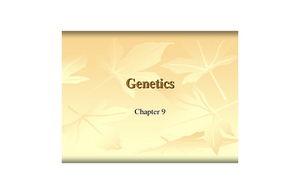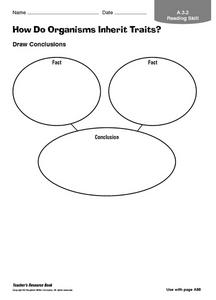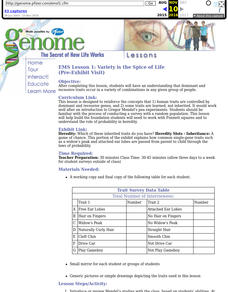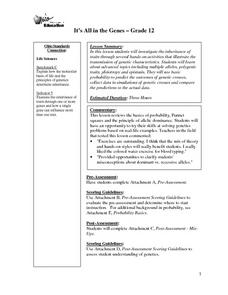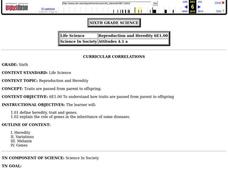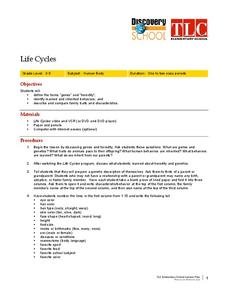Beyond Benign
Real Cats Wear Pink
Does your cat sneak up on you in the middle of the night? Maybe it would help if he glowed in the dark like Mr. Green Genes, the first fluorescent cat in America. In a fun and engaging lesson about genetic engineering, high school...
Serendip
Genetics Review Jeopardy Game
Why not add a little excitement to review day? Play genetic Jeopardy to quiz your classes before they take the assessment. The resource provides a game board in PowerPoint with questions related to meiosis and prediction of traits.
Illinois Department of Natural Resources
Section One: What is Biodiversity?
Four intriguing and scientific activities invite learners to explore the natural resources of their town. The activities cover concepts such as genetic traits, organizing species in a taxonomy, the differences between different species...
K20 LEARN
More than Skin Deep
From crime to paternity, DNA fingerprinting has revolutionized how the world views inherited traits. Science sleuths investigate the facts about DNA profiling through a variety of activities. The Teacher's Guide includes printable...
Howard Hughes Medical Institute
Pedigrees and the Inheritance of Lactose Intolerance
What, exactly, causes lactose intolerance? Scholars view a video describing a Finnish study that determined why some people are tolerant while others are intolerant. They then use the data from the study to reenact the experiment and...
Howard Hughes Medical Institute
Molecular Genetics of Color Mutations in Rock Pocket Mice
Can you identify mutations just by viewing DNA sequences? Scholars apply prior knowledge of DNA sequences to do just that in an engaging activity. They transcribe and translate genes, thus identifying the locations of mutations. Then,...
Curated OER
Genetics
Students create a checklist of traits common in all of their families. Uisng a table, they compare and contrast their family members to non-family members. They also review dominant and recessive traits and discuss how knowing about...
Curated OER
How Do Organisms Inherit Traits
In this traits worksheet, students will write down 2 facts about how traits are inherited and then come to a conclusion based on their facts. This worksheet is a graphic organizer.
Curated OER
EMS Lesson 1: Variety is the Spice of Life
Students discern that dominant and recessive traits occur in a variety of combinations in any given group of people.
Curated OER
Variety is the Spice of Life
Young scholars explore Gregor Mendel's work with genetics. They complete a survey of their friends and family in order to identify dominant and recessive traits. Once their surveys are complete, students discuss the ways in which...
Curated OER
From Gene to Protein
Here is a detailed presentation to assist in your lectures on the difficult topic of genetic transcription. The history, discovery, and scientific breakthroughs will spark interest. The last 15 slides deal with the biochemistry and...
Curated OER
Genes within Populations
Finally, here is a genetics worksheet that does not include Punnett squares! Designed for a more advanced class, biology learners will compare Lamarck's concept of evolution with Darwin's. They will explore the Hardy-Weinberg equilibrium...
Curated OER
Punnett Squares
Fifth graders examine how traits are passed to their offspring using Punnett Squares. They demonstrate how a Punnett Square works by physically moving around boxes taped on the floor, representing the different traits of chicks and...
Curated OER
It's All in the Genes
Twelfth graders investigate the inheritance of traits through several hands-on activities that illustrate the transmission of genetic characteristics. Students study advanced topics including multiple alleles, polygenic traits,...
Curated OER
Nature And Nurture
Students develop an understanding of the role both nature and nurture play in determining an individual's traits. Using a website, students answer questions about nature and nurture in order to solve the riddle, What do you call a smart...
Curated OER
Born of Blood
Learners define attributes of human chromosomes and match them to make a human karyotype. In this investigative lesson students demonstrate how traits are encoded in genes found on chromosomes.
Curated OER
Reproduction and Heredity
Sixth graders investigate how traits are passed from parents to their offspring. They list things they have in common with family members, read key vocabulary terms, create a poster of shared physical and personality traits, and watch...
Curated OER
Heredity
In this heredity learning exercise, students review how genes are involved in the inheritance of certain traits through generations. Students complete a Punnett square and review probability. This learning exercise has 11 short answer...
Curated OER
Heredity Worksheet #4
For this genetics worksheet, students use a pedigree to determine if any of the offspring carry a recessive trait. This worksheet has 5 fill in the blank and 5 short answer questions.
Curated OER
Life Cycles
Learners identify inherited traits. In this heredity lesson, students watch a video and construct a genetic description of themselves.
Curated OER
Born of Blood
Eighth graders use a large Punnett Square and infer how genes determine blood types. In this blood type instructional activity students predict blood types and demonstrate how Punnett Squares are related to genes and...
Curated OER
What is Genetics?
In this biology worksheet, 9th graders name two forms of the trait for seed shape observed by Mendel. Then they determine the percentage of the possible types of offspring that have the same genotype as the parents. Students also explain...
Curated OER
Basic Genetics
Ninth graders discover where their physical appearance and personality traits come from. In this genetics lesson, 9th graders learn about cells, chromosomes, DNA and genes. Students discover where genes come from as well as dominant and...
Curated OER
Fun with Heredity
Students explore basic concepts of heredity and collaborate to see genetics in action through several activities provided in the lesson. Inherited traits are examined and identified as dominant or recessive.








